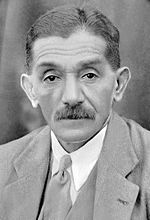Ketoli Chengappa facts for kids
Quick facts for kids
Ketolira Chengappa
|
|
|---|---|
 |
|
| Chief Commissioner of Coorg Province | |
| In office 26 April 1943 – March 1949 |
|
| Preceded by | J. W. Pritchard |
| Succeeded by | C. T. Mudaliar |
| Personal details | |
| Born | 3 March 1878 |
| Died | 1963 |
| Alma mater | University of Madras |
Ketolira Chengappa (1878-1963) was an important Indian government official. He served as the Chief Commissioner of Coorg Province from 1943 to 1949. This was a very high position during British rule in India. He was also known by special titles like Dewan Bahadur and C.I.E..
Contents
Early Life and School
Chengappa was born on March 3, 1878. His parents were Ketolira Muddaiah and Bolliavva. They lived in Yavakapadi Village, near Napoklu. He finished his early schooling in 1893. After that, he went to the University of Madras and earned his degree. Later, he passed a tough exam to join the Indian Civil Service (ICS). This was a very important group of officials who helped run British India.
His Career and Achievements
Chengappa started his career in 1909 as a parpathigar. He worked his way up to become an Assistant Commissioner by 1916. In 1921, he made history. He became the first Indian person to be appointed as a District Magistrate by the British.
After working as Commissioner of Coorg in 1935, he took on another important role. In 1942, the British made him the Chief of the National War Front in Coorg. Then, on April 26, 1943, he became the Chief Commissioner of Coorg Province. He held this top job until March 1949. During this time, he was given the special title of Diwan Bahadur.
Chengappa received many awards from the British for his excellent work. These included the title of Dewan Bahadur. He also received the C.I.E. (Companion of the Order of the Indian Empire) in 1946. He was even made an honorary Lieutenant in 1923, though he resigned in 1928. This was a respected position offered in Kodagu by the British.
Chengappa also helped the coffee industry. In the 1920s, he helped create the Indian Coffee Cess Committee. This committee helped British-run coffee farms form a group called "Consolidated Coffee." In 1936, the Indian Cess Committee helped start the Indian Coffee Board. This led to the famous India Coffee House chain. These coffee houses, run by workers, became very popular. They helped start a "coffee revolution" across India that lasted for many years.
After India's Freedom
When India became free in 1947, Chengappa played a special role. He was the one who raised the Indian flag at Mercara fort. He also took down the British Union Jack flag during the ceremony in Coorg province. He was the last Chief Commissioner of Coorg. He was also the only Indian person to hold this position during the time of British rule. Before him, only Englishmen had this job.
His Family Life
Chengappa had a son named Captain K. C. Medappa. His son went to Bishop Cotton Boys' School in Bangalore. Captain Medappa was an officer in the Frontier Force Regiment. Sadly, he died in battle on December 16, 1941. This happened during the Malayan Campaign.
Ketolira Chengappa passed away in 1963. He was 85 years old.
See also
- List of Chief Commissioners of Coorg

